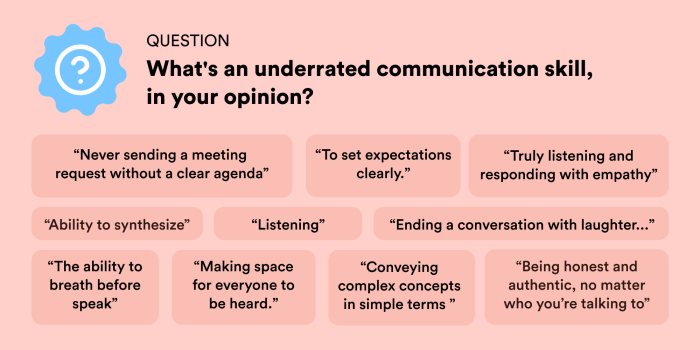Effective Communication Skills is all about honing your ability to connect with others on a deeper level. From navigating professional relationships to enhancing personal interactions, these skills play a crucial role in every aspect of our lives. So, buckle up and get ready to dive into the world of effective communication!
Importance of Effective Communication Skills
Effective communication skills are crucial in both professional and personal settings as they play a vital role in building strong relationships and enhancing productivity. When individuals can express themselves clearly and listen actively, it leads to better understanding and cooperation among team members, colleagues, friends, and family members.
Positive Impact on Relationships
Effective communication skills can positively impact relationships by fostering trust, empathy, and mutual respect. When individuals communicate openly and honestly, they can resolve conflicts, strengthen connections, and build stronger bonds with others. For example, active listening and clear expression of thoughts and feelings can help partners in a romantic relationship understand each other better and navigate challenges together.
Enhanced Productivity
In professional settings, effective communication skills can enhance productivity by ensuring that tasks are understood clearly, expectations are communicated effectively, and feedback is provided constructively. When team members can communicate efficiently, they can collaborate seamlessly, make informed decisions, and achieve goals more effectively. For instance, a project manager who communicates goals, timelines, and expectations clearly to team members can ensure that everyone is on the same page and working towards a common objective.
Consequences of Poor Communication
On the flip side, poor communication can lead to misunderstandings, conflicts, and inefficiencies in various contexts. In a professional setting, unclear instructions, miscommunication of expectations, and lack of feedback can result in missed deadlines, errors, and decreased morale among team members. Similarly, in personal relationships, a lack of effective communication can lead to resentment, mistrust, and distance between individuals. For example, if family members do not communicate openly about their needs and feelings, it can strain their relationships and lead to misunderstandings.
Components of Effective Communication Skills

Effective communication skills are crucial in both personal and professional settings. Here are key components that contribute to effective communication:
Active Listening
Active listening involves fully concentrating, understanding, responding, and remembering what is being said. It shows respect and interest in the speaker, fostering better understanding and building stronger relationships. For example, paraphrasing what the speaker said can demonstrate active listening, ensuring clarity and preventing misunderstandings.
Clarity
Clarity in communication involves expressing thoughts and ideas clearly and concisely. Using simple language, avoiding jargon, and structuring messages logically can enhance clarity. For instance, providing specific examples or visual aids can help clarify complex concepts or instructions.
Empathy, Effective Communication Skills
Empathy is the ability to understand and share the feelings of others. It plays a crucial role in effective communication by building trust, fostering connection, and resolving conflicts. For example, acknowledging someone’s emotions and responding with compassion can demonstrate empathy, leading to more meaningful interactions.
Non-Verbal Communication
Non-verbal communication encompasses gestures, facial expressions, body language, and tone of voice. It complements verbal communication, conveying emotions, attitudes, and intentions. For instance, maintaining eye contact, using appropriate gestures, and mirroring body language can enhance the overall message being communicated.Verbal and non-verbal communication are both essential in conveying messages effectively. While verbal communication focuses on words and language, non-verbal communication provides additional cues that can enhance or contradict the verbal message.
Mastering both aspects of communication can lead to clearer understanding, improved relationships, and successful outcomes in various interactions.
Developing Effective Communication Skills
When it comes to improving your communication skills, there are several strategies you can implement to enhance your overall effectiveness in conveying messages and understanding others.
Improving Active Listening Skills
- Focus on the speaker without interrupting, showing genuine interest in what they have to say.
- Paraphrase what you have heard to ensure understanding before responding.
- Ask clarifying questions to delve deeper into the speaker’s point of view.
- Avoid distractions and maintain eye contact to demonstrate attentiveness.
Enhancing Clarity and Conciseness in Communication
- Organize your thoughts before speaking to convey your message clearly and cohesively.
- Avoid jargon and elaborate explanations, opting for simple and straightforward language.
- Use concrete examples and visuals to illustrate your points effectively.
- Solicit feedback from others to ensure your message is easily understood.
Cultivating Empathy and Understanding in Conversations
- Put yourself in the other person’s shoes to see things from their perspective.
- Practice active listening and validate the other person’s feelings and experiences.
- Avoid judgment and criticism, focusing on building rapport and trust.
- Ask open-ended questions to encourage meaningful dialogue and deeper connections.
Overcoming Communication Barriers

Effective communication can be hindered by various barriers that can arise in different situations. It is important to identify these barriers and find ways to overcome them in order to ensure clear and successful communication.
Identifying Common Barriers
- Physical barriers such as noise, poor lighting, or distance can impede communication. To overcome these, ensure a quiet environment, adequate lighting, and minimize the distance between the individuals involved.
- Psychological barriers like preconceived notions, stereotypes, or emotions can also affect communication. It is important to actively listen, be open-minded, and practice empathy to overcome these barriers.
- Language barriers can arise when individuals speak different languages or use technical jargon. To overcome this, use simple and clear language, provide explanations when needed, and be patient in understanding each other.
Navigating Cultural Differences
- Cultural differences can impact communication due to varying norms, values, and communication styles. To navigate these differences, it is important to be aware of cultural differences, show respect for other cultures, and adapt communication strategies accordingly.
- Avoid making assumptions based on stereotypes and take the time to learn about different cultural practices to enhance cross-cultural communication.
Tips for High-Stress Situations
- In challenging or high-stress situations, it is important to remain calm, composed, and focused on the issue at hand. Avoid reacting impulsively or emotionally, and take the time to think before responding.
- Practice active listening, ask clarifying questions, and ensure that your body language conveys openness and receptiveness to maintain effective communication even in stressful situations.
